‘Damn you, garlic! Why aren’t you alive?’
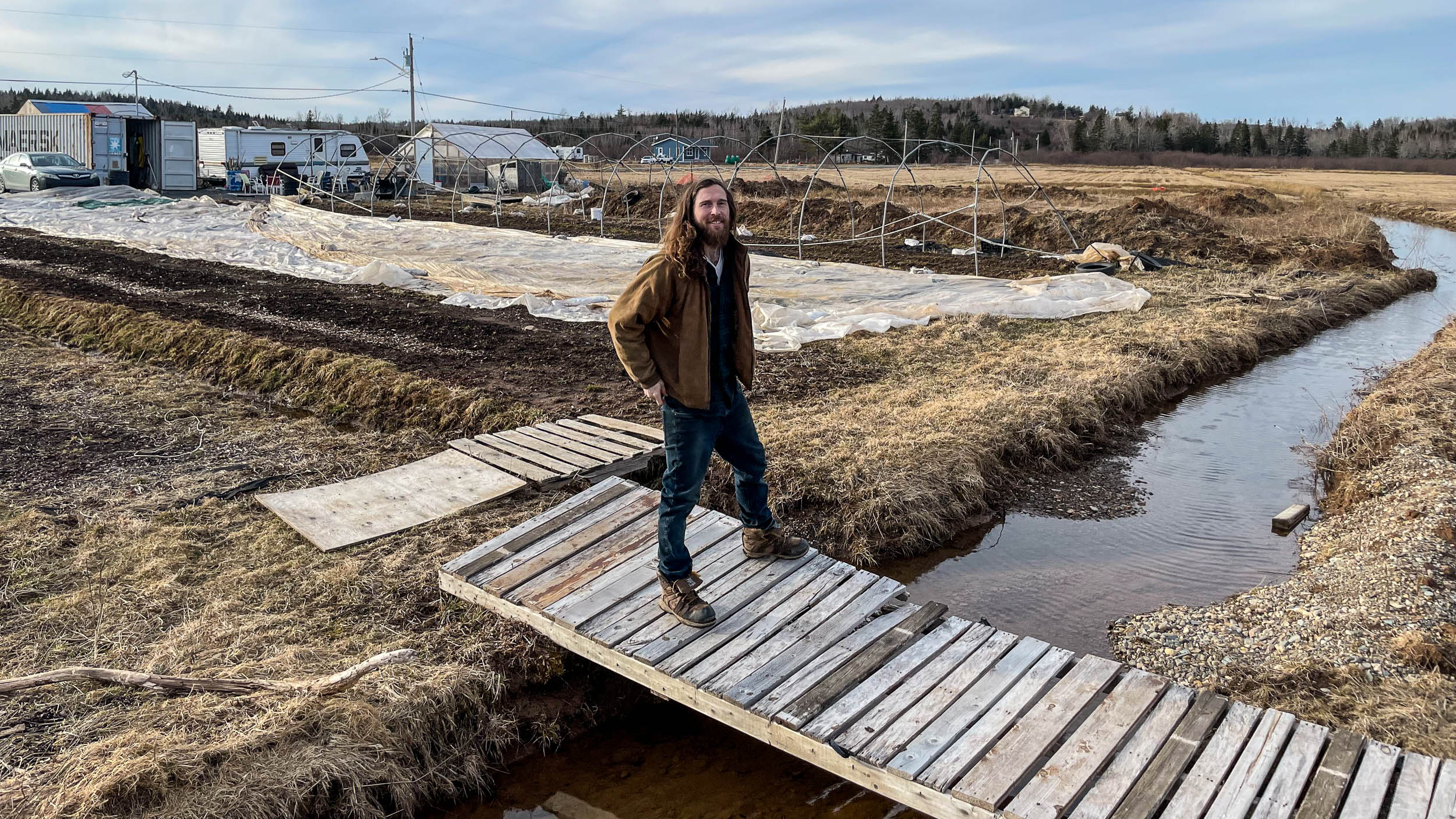
caption
Noah is preparing for the 2024 growing season after his crops were washed out by flooding in the summer of 2023.Small-scale farmer whose crops were devastated by 2023 flooding still believes communities can fight climate change
Noah is a 32-year-old small-scale farmer in Wyses Corner, Nova Scotia. During the height of the summer season, Noah lives in a camper on the farm with his trusty dog, Hercules.
Noah grew up in Dartmouth, Nova Scotia. He played competitive sports, went to science camps and liked spending time in his grandmother’s garden. He played hockey at the University of Toronto for a year, before realizing the sport’s culture wasn’t for him: “When you’re a jock it’s a powerful mask. You’re not going to be attacked. By being good at sports, I was handed that mask and I just kept it on for however long until it no longer fit.”
Noah quit the team. He tried studying economics at Saint Mary’s University and then briefly being an artist. But a mental health crisis, which resulted in him being hospitalized for 10 days, forced him to reassess both who he was and what he wanted out of life. Following a lifelong passion for food and health, he enrolled at the Canadian School of Natural Nutrition and finished his program in 2018.
That summer, he volunteered on his aunt and uncle’s garlic farm and was immediately hooked. He wanted to grow his own garlic – enough that he’d never have to buy the grocery store stuff again. “If you haven’t tried local garlic, you need to try it. It will change your life. Literally, it changed my life.”
Noah threw himself into learning about organic farming. In 2020, he bought a 25-hectare property and launched his small-scale market garden business. Since that time, he’s noticed an increase in the water level of the brook that runs across his land. During the 2023 floods, the brook rushed up over the bank and destroyed many of his favourite and best-selling crops.
The flood happened in early July, and that’s about the busiest it gets on a market garden in Nova Scotia. The biggest parts of the job are seeding and harvesting, and July is the one time a year when you’re doing both. So you’re as tired as you’re going to be: you’re mostly harvesting, but also making sure the plants don’t die.
Friday was a harvest day. I was starting seeds, spreading wood chips, and building new garden beds for summer planting. We had second successions of zucchinis and carrots and beets and lettuce. The farm was looking its best. I can still feel that feeling of standing there, thinking about how great things were going.
I took a break to eat in the camper and it was sunny. Then, about a half hour into my break, it started raining. I was like, “That’s not great. Hopefully it stops raining. Why didn’t they predict any of this rain?”
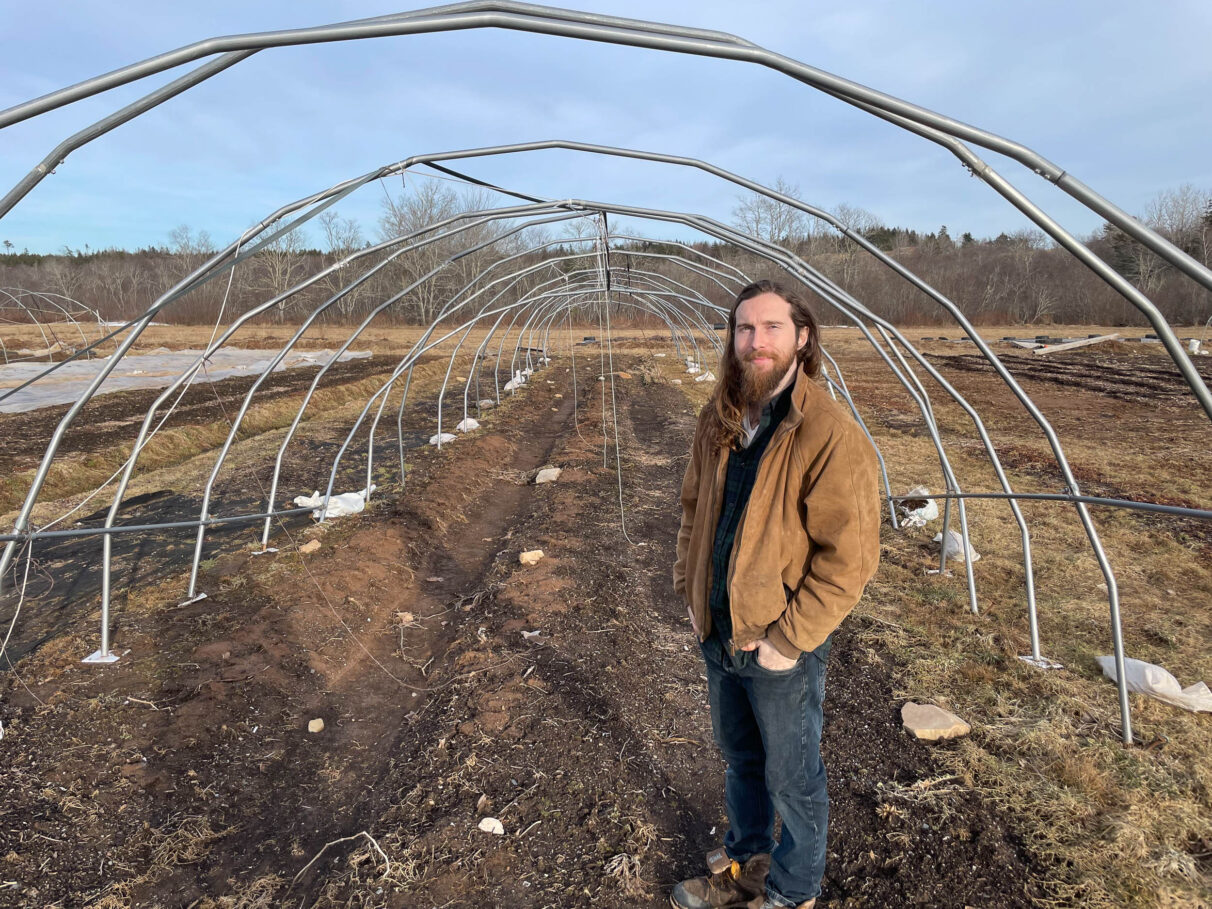
caption
Noah stands beneath the frame of one of the greenhouses on his farm. In 2023, the rain submerged one of his greenhouses and caused another to collapse.I went into this greenhouse. The plastic was over the greenhouse and it’s really loud when it’s raining. It’s amplified, like a drum. After about an hour of being in here harvesting, the water was over the pathway and the soil was underwater.
I heard a crack. I was like, what was that? It was also thunder and lightning, but I didn’t think a whole lot of it ’cause I was just harvesting. When I came out, I saw that this second greenhouse had collapsed in the middle. Water was pooling on the plastic. I put the stuff I harvested away, went into that greenhouse and I’m like, “Let me just push some of this water off.” I was standing under a hoop, then the whole thing starts rocking back and forth and it went down..
While I was in the greenhouse, I called my friend Sandy — he helps me out on the farm and transport veg sometimes — who had been here earlier that day. I said that one of the greenhouse ribs collapsed and I’m a little worried, do you mind coming back just in case I need an extra hand getting home? So he thankfully came back. I had comfort in knowing that somebody knew where I was and what I was dealing with at that time.
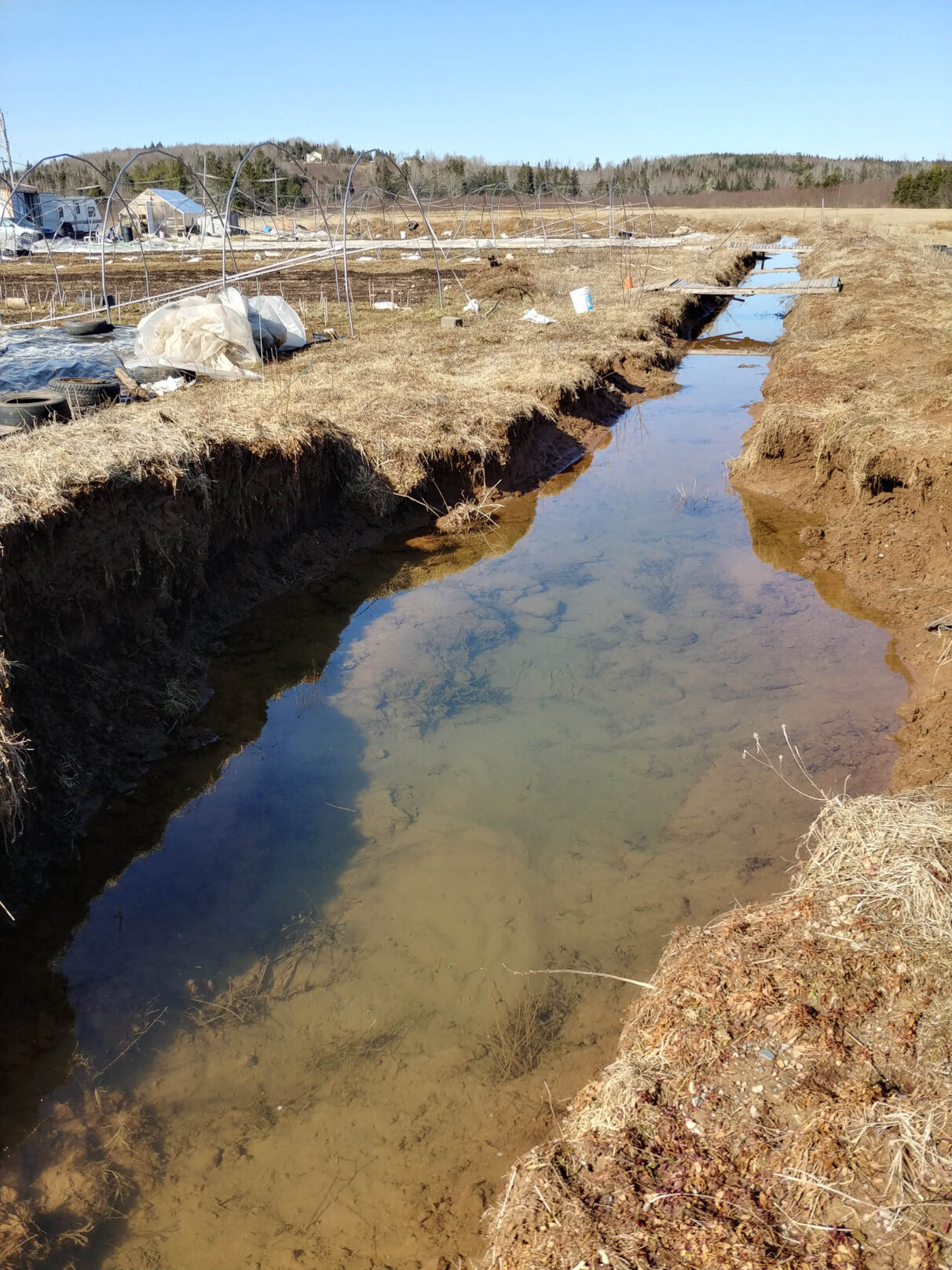
caption
This is one of the ditches Noah dug on his farm to help redirect water in the event of a flood, but it was no match for the deluge he experienced in the summer of 2023.I finished picking basil and it was literally underwater. I got a bag about as full as I wanted it to be, and I said, “Let me just get out of here now.” When I came out, I was in disbelief. The brook was on the field; it had crested and was rushing in one direction — directly at the farm. The water was raging so fast. It was just gushing. I had built these ditches and swales in a way to redirect water in the event of this happening; it was such a volume of water that it overwhelmed the ditches. It created these massive gullies. The last thing I did was to carry my dog to the vehicle after everything was loaded up. I let him try to walk on his own, but he wasn’t comfortable doing it.
Since then, it’s kind of been nonstop chaos. If I knew the flood was coming, I would’ve harvested all the garlic. I’m going through these bags of garlic that are like 75 to 85 per cent rotten, and every time I touch one it makes me feel this thing I can’t really put into words. It’s depressing, I guess that’s the word. I’m just like, “Damn you, garlic! Why aren’t you alive?” I would have a lot more money right now if it hadn’t happened. Tomato, garlic, and winter squash basically have guaranteed sales. I love those crops; it’s sad having those amazing tastes lost.
The farm was in a great place and now it’s been tough to pick up the pieces because there’s a lot of emotional heaviness. I haven’t really put it all together. I know that it happened, but I haven’t really thought about all the ways that my own life changed that day. I still haven’t fully given my parents the blow-by-blow because I just don’t want to talk about it now anyway. I haven’t wanted to sit down and look at all the videos and pictures and really think about it.
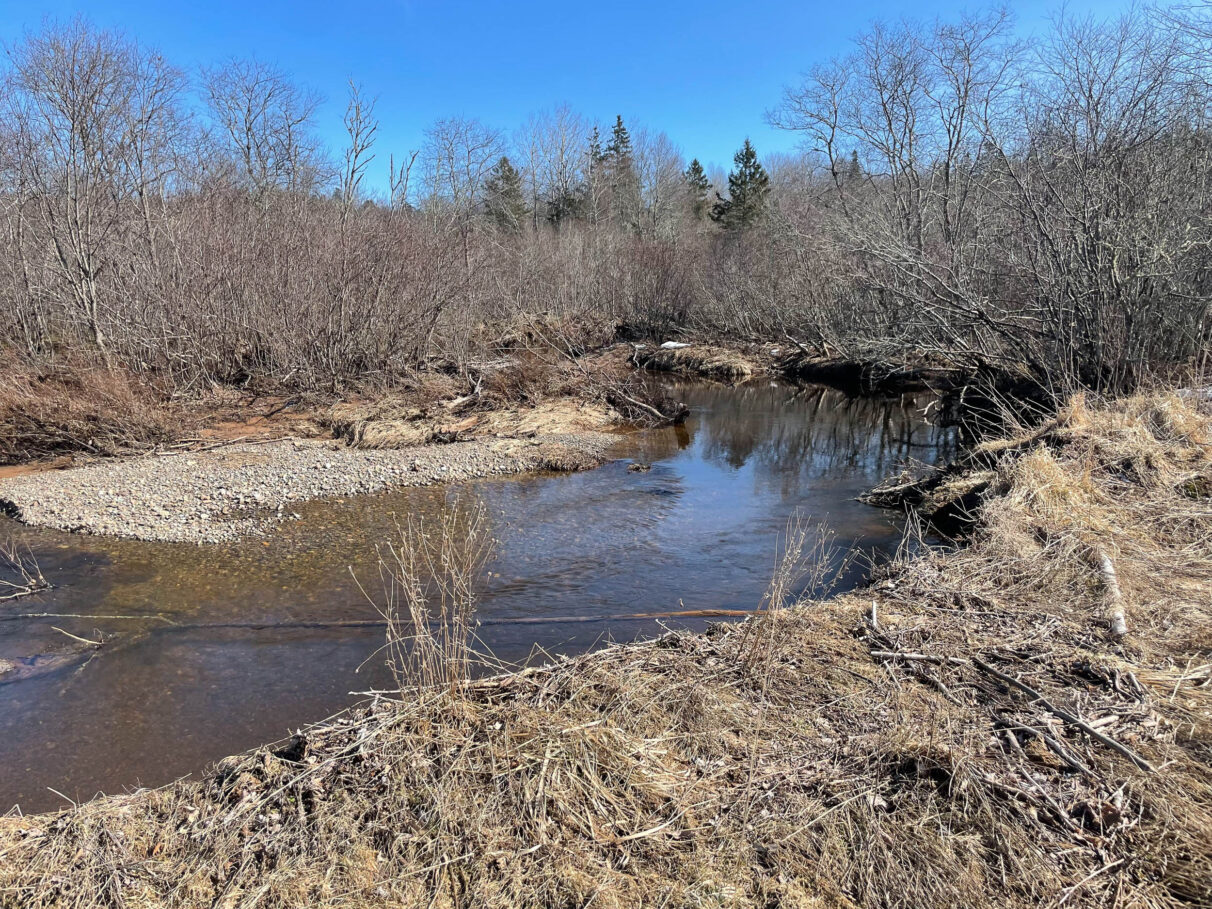
caption
In the short time he’s owned the farm, Noah has observed a steady increase in the water levels of the brook that runs across his property.I had just started a relationship. If it wasn’t for that, I probably would not be able to have such a pulled-back view of it. I was able to shift my focus on making my relationship a success. The farm is alive, and there’s enough money in my bank account to keep going. I didn’t think I was going to die in the flood, but anything could have happened. I gave myself permission to not obsess over it and to accept that love was moving into my life. So the night I got back from the flood, I just went to her place and told her I loved her. There’s no sense in waiting. She said it back, and we’ve been in love ever since.
I’m thinking a lot about what happened and how to deal with it again, because I know these days the climate is a-changin’. I’m expecting a child, and I was planning to double revenue this year. That means I’m going to have to come up with some emergency plans.
You can’t really be a farmer without being an optimist. An act of planting a seed: that’s optimism. Because so many things have to go right – and they generally will, that’s the beauty of it. I’ll be starting seeds and there’ll be a seed that grows in a tray that was from two years ago. And you’re like, where did this seed come from? It was just in the dirt, and now it’s in your tray of onions. Plants are alive, and life wants to live.
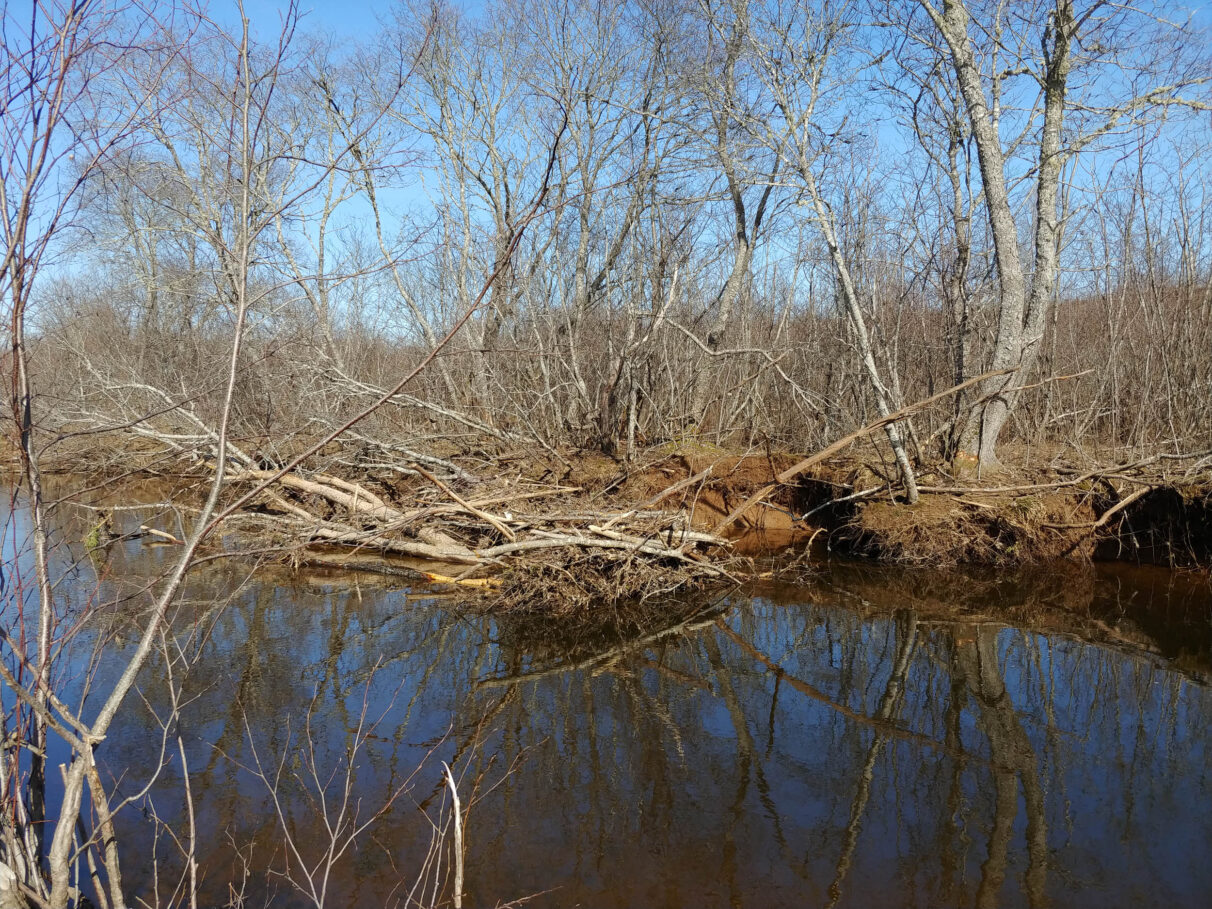
caption
This is the brook that cuts across Noah’s farm in Wyses Corner, N.S. In the summer of 2023, it overflowed its banks and flooded Noah’s garden beds and greenhouses.Many of us are convinced there’s nothing we can do. I don’t want to believe that, and I will not believe that. So, I keep acting as though I can make a difference. I’ve got a community I can learn from; that just gives me hope that there’s so many more people who want the world to keep spinning than there are those who don’t give a crap. It’s just that those people have such an outsized voice. Is there will? The institutions that have to make the changes are so large. So how do we make them make the changes? I don’t know.
I remember being a kid and being an empty vessel and learning about reducing, reusing, recycling. We could teach the kids today a different way of life – and that’s why I want to have a family. That’s why I care about these things – if I can’t do it for the world, I’ll do it for me and my family.
Editor's Note
During his interview for this story, Noah indicated that he’d like to give special thanks to his friend Sandy for his help on the farm during the flood. “Our families are best friends,” Noah said. “Sandy is an engineer and a tall, strong, capable person who grew up on a farm. His wife passed away from ovarian cancer one year ago after he retired, and he has thrown himself into being a key member of my farm team.”
About the author

Noah Pohlkamp-Hartt as told to K.C. Jordan
